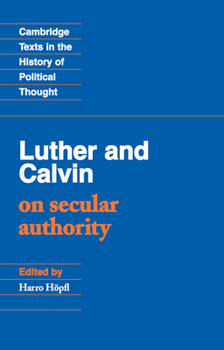Luther and Calvin on Secular Authority
Select Format
Select Condition 
Book Overview
Martin Luther and John Calvin were the principal 'magistral' Reformers of the sixteenth-century: they sought to enlist the cooperation of rulers in the work of reforming the Church. However, neither regarded the relationship between Reformed Christians and the secular authorities as comfortable or unproblematic. The two pieces translated here, Luther's On Secular Authority and Calvin's On Civil Government, constitute their most sustained attempts to find the proper balance between these two commitments. Despite their mutual respect, there were wide divergences between them. Luther's On Secular Authority would later be cited en bloc in favour of religious toleration, whereas Calvin envisaged secular authority as an agency for the compulsory establishment of the external conditions of Christian virtue and the suppression of dissent. The introduction, glossary, chronology and bibliography contained in this volume locate the texts in the broader context of the theology and political thinking of their authors.
Format:Paperback
Language:English
ISBN:0521349869
ISBN13:9780521349864
Release Date:September 1991
Publisher:Cambridge University Press
Length:146 Pages
Weight:0.46 lbs.
Dimensions:0.3" x 5.4" x 8.4"
Customer Reviews
1 rating
Not exhaustive, but useful and well translated
Published by Thriftbooks.com User , 23 years ago
As with all of these Cambridge "Political Writings" series, this book is perhaps better title "Essential Political Writings" or "Basic Political Writings", for it is far far from comprehensive, in fact it contains only a chapter of one of Calvin's "Institutes" and a small piece by Luther. Yet as is also the case with this Cambridge series, it is an excellent translation with a very good introduction. This is a very useful text and is as essential for academics as it is fascinating for the generally curious. Highly recommended, as long as the buyer does not believe it is a one-stop-shop for the "secular" (whatever that word means in then 16th century) thought of these two reformers with regard to government.





